Researching Tomorrow’s Communication Today
Institute for Communications and Gamification Research
About Us
At the Institute for Communications and Gamification Research (iComGam), our aim is to make research more accessible and enjoyable for the younger generation.
We are committed to transforming the landscape of learning and communication through innovative approaches such as game-based learning, social media content creation, and strategic public relations. Our mission is to bridge the gap between cutting-edge research and real-world application, empowering individuals and organizations to communicate effectively and engage meaningfully.
By harnessing the power of gamification, we strive to create immersive and engaging educational experiences that resonate with today’s youth. Our collaborative efforts with global partners enable us to advance quality education, foster economic growth, and drive innovation, all in alignment with the United Nations’ Sustainable Development Goals. Join us in revolutionizing the way we learn, create, and connect, making research an exciting and impactful journey for the younger generation.
We are committed to transforming the landscape of learning and communication through innovative approaches such as –
The Institute for Communication and Gamification Research (iComGam) emphasizes on engaging the younger generation in learning through modern and unconventional methods. Gamification, digital technology, and social media all help to communicate scientific and educational ideas in a more lively and accessible way. This approach not only inspires, but also opens up new opportunities to engage with information in an interactive environment.
Today’s digital space offers a host of solutions that combine convenience and innovation. This includes online entertainment, where security and ease of payment are important. The use of tools such as Apple Pay becomes especially relevant for those who choose the best online casinos. Reliable platforms with support for convenient deposit methods make you feel more confident when choosing a site. For example, in the list of suitable options you can consider https://twincast.de/de-at/zahlungsmethoden/apple-pay/, a platform where current offers and convenient payment methods are collected
Combining new technologies with educational and entertaining functions is the key to progress. Organizations such as iComGam create the ground for learning and recreation to be both useful, exciting and safe.

![]()
Research for
media content creation and
media effect
![]()
Game-based learning
![]()
Research for
strategic public relations
![]()
Innovation in
Social and Behavioral
Change Communication
![]()
Global Partnership for
development of Academia
in Communications studies
Our Values

Innovation
Embracing cutting-edge approaches to transform education and communication.

Collaboration
Leveraging partnerships and collective effort for impactful research

Impact
Creating lasting, positive impacts on society.

Excellence
Upholding the highest standards of research and practical application.

Sustainability
Aligning our initiatives with the UN’s Sustainable Development Goals.
Our Vision
To be a global leader in communication and gamification research, shaping the future of how we learn, create, entertain, and connect. We envision a world where communication is meaningful and effective, enabling deeper connections through innovative strategies and tools. Our research bridges the gap between theory and practice, ensuring real-world applications that can transform industries and societies.
Join Us
Our Goals
To be a global leader in communication and gamification research, shaping the future of how we learn, create, entertain, and connect.
To create a world where communication is meaningful and effective, enabling deeper connections through innovative strategies and tools, all in alignment with the United Nations’ Sustainable Development Goals.
SDG4

Quality Education
Increase the number of youth and adults with relevant skills for employment, decent jobs, and entrepreneurship.
SDG8

Decent Work & Economic Growth
Achieve higher levels of economic productivity through diversification, technological upgrading, and innovation.
SDG9

Industry, Innovation & Infrastructure
Enhance scientific research, upgrade the technological capabilities of industrial sectors in all countries.
Overall Objective
-
Enhance Learning: Transform education through game-based learning.
Specific Objective:
Develop and implement game-based learning modules in at least five university-level communication courses by December 2030.
Specific Strategies:
- Create engaging, curriculum-aligned game-based learning modules.
- Indicator: Number of game-based learning modules developed by December 2025.
- Target: 5 modules.
- Track the number of courses and students using the modules and their performance metrics.
- Indicator: Number of courses using the modules and improvement in student performance metrics.
- Target: At least 5 courses and a 20% increase in student performance.
- Collaborate with educational institutions for module integration.
- Indicator: Number of partnerships established with educational institutions.
- Target: At least 3 partnerships by December 2030.
- Ensure modules are relevant to current communication course content.
- Indicator: Percentage of modules reviewed and updated to align with course content.
- Target: 100% relevance and alignment.
- Achieve implementation by December 2030.
- Indicator: Completion date for module implementation.
- Target: All modules implemented by December 2030.
Aligned with SDG 4: Enhance quality education and promote lifelong learning opportunities.
-
Advance Research: Conduct cutting-edge research with practical applications.
Specific Objective:
Publish at least ten peer-reviewed research papers on game-based learning and communication strategies by the end of 2030.
Specific Target
- Identify key research areas and allocate resources for investigation.
- Indicator: Number of key research areas identified and resources allocated.
- Target: At least 5 research areas identified by mid-2025.
- Measure success by the number of publications and citations.
- Indicator: Number of peer-reviewed papers published and citation count.
- Target: 10 papers published and at least 50 citations per paper by 2030.
- Engage a team of researchers and provide necessary support.
- Indicator: Number of researchers engaged and support mechanisms in place.
- Target: At least 10 researchers engaged with ongoing support.
- Focus on research with practical applications for the education and communication sectors.
- Indicator: Number of research projects with practical applications.
- Target: 100% of research projects have practical applications.
- Complete the publications by the end of 2029.
- Indicator: Publication dates for all research papers.
- Target: All papers published by December 2029.
Aligned with SDG 9: Promote innovation and enhance research capabilities.
-
Promote Collaboration: Foster partnerships for impactful research and innovation.
Specific Objective:
Establish at least five strategic partnerships with universities, industry leaders, and research institutions by 2030.
Specific Strategies:
- Identify and reach out to potential partners aligned with our mission.
- Indicator: Number of potential partners identified and contacted.
- Target: At least 10 potential partners contacted by 2027.
- Track the number and quality of partnerships and collaborative projects initiated.
- Indicator: Number of strategic partnerships established and collaborative projects initiated.
- Target: 5 partnerships and 5 projects by 2030.
- Develop mutually beneficial collaboration agreements.
- Indicator: Number of formal collaboration agreements signed.
- Target: 5 agreements signed by 2028.
- Ensure partnerships are strategically aligned with research and innovation goals.
- Indicator: Percentage of partnerships aligned with strategic goals.
- Target: 100% alignment.
- Secure partnerships by 2025.
- Indicator: Date by which all partnerships are secured.
- Target: All partnerships secured by December 2025.
Aligned with SDG 17: Strengthen partnerships for sustainable development.
-
Drive Innovation: Lead the way in communication and gamification research.
Specific Objective:
Launch an annual conference on communication and gamification research by 2025, attracting at least 200 participants from academia and industry.
Specific Targets:
- Plan and organize the conference focusing on the latest research and innovations.
- Indicator: Number of conferences planned and organized.
- Target: First conference held by December 2025.
- Monitor attendance, participant feedback, and media coverage.
- Indicator: Number of attendees, feedback scores, and media mentions.
- Target: At least 200 participants, 85% positive feedback, and 20 media mentions.
- Collaborate with stakeholders to ensure a diverse range of speakers and attendees.
- Indicator: Number of diverse speakers and attendee demographics.
- Target: At least 20 speakers from diverse backgrounds and industries.
- Focus on themes that align with current industry and academic interests.
- Indicator: Number of relevant themes and sessions at the conference.
- Target: At least 10 themes aligned with industry and academic interests.
- Hold the first conference by the end of 2025.
- Indicator: Date of the first annual conference.
- Target: Conference held by December 2025.
Aligned with SDG 9: Foster innovation and knowledge sharing in the industry.
-
Sustainable Development: Contribute to the UN’s Sustainable Development Goals.
Specific Objective:
Integrate sustainability principles into all iComGam projects and initiatives, ensuring alignment with SDG 4, SDG 8, and SDG 9 by 2030.
Specific Strategies:
- Embed SDG targets into project planning and execution.
- Indicator: Percentage of projects with embedded SDG targets.
- Target: 100% of projects by 2025.
- Evaluate the impact of each project on the relevant SDGs.
- Indicator: Number of impact evaluations conducted.
- Target: Impact evaluations for all projects by 2030.
- Train staff and partners on sustainable practices and SDG alignment.
- Indicator: Number of training sessions held and participants trained.
- Target: At least 5 training sessions and 100 participants by 2030.
- Focus on projects that drive sustainable education, economic growth, and innovation.
- Indicator: Number of projects with a focus on sustainability, economic growth, and innovation.
- Target: At least 10 projects by 2030.
- Achieve full integration by 2030.
- Indicator: Date by which all projects are fully aligned with SDG principles.
- Target: Full integration by December 2030.
Aligned with SDG 4, SDG 8, and SDG 9: Ensure all projects contribute to these global goals.
Milestones

Foundation
Establishing iComGam with a focus on game-based learning and innovative communication strategies.

Collaborative Research
Partnering with global institutions for groundbreaking research projects.

Award-Winning Projects:
Recognized for our game-based learning initiatives at international competitions.

Global Impact
Contributing to the UN’s Sustainable Development Goals through our research and initiatives.
Target Audience
| Internal |
|
| External |
|
| Intervening |
|
Public Engagement Types
|
Active Currently engaged and participating. |
Passive Aware but not actively participating |
Latent Unaware but potential to engage. |
|
| Internal |
Students currently engaged in game-based learning modules. Academics actively incorporating innovative teaching methods. Creative Professionals actively seeking new ways to drive engagement. |
Students aware of game-based learning but not actively participating. Academics aware of innovative teaching methods but not currently using them. Creative professionals aware of gamification but not currently applying it. |
Students unaware of the benefits of game-based learning but have the potential to engage. Academics unfamiliar with game-based learning but open to adopting new teaching strategies. Creative professionals unaware of gamification’s potential but interested in innovation. |
| External |
Academic Institutions already collaborating on game-based learning projects. Business Leaders actively seeking and implementing effective communication strategies. |
Academic Institutions aware of game-based learning but not currently involved. Business leaders aware of the benefits of advanced communication strategies but not yet implementing them. |
Academic Institutions unaware of game-based learning’s potential but interested in enhancing their curricula. Business leaders unaware of the advanced communication strategies but interested in exploring new approaches. |
| Intervening |
Professionals in various industries actively promoting and adopting gamification and innovative communication. Individuals actively supporting policies and programs that integrate innovative teaching methods. |
Professionals aware of innovative communication strategies but not yet adopting them. Policy makers and Academic administrators aware of innovative teaching methods but not actively promoting them. |
Professionals unaware of the benefits of gamification and advanced communication strategies but open to learning. Policy makers and academic administrators unfamiliar with gamification but interested in policy innovation. |
Our Projects
Gamification Projects
-
Mystery Campaign Challenge: A game-based learning project to enhance Public Relations education through interactive simulations. -
Escape Room Board Game: This initiative includes an escape room board game designed to teach youngsters the value of fact-checking and ethical media use through engaging and interactive gameplay.
Collaboration Projects
-
Partnership with Finlatics: to extend our partnership with finlatics.com, bringing their innovative finance and investment education programs to Bangladeshi students. Together, we aim to empower the next generation with essential financial and technological literacy and practical skills, fostering a brighter future for students in Bangladesh. -
Partnership with NobleDr+: to translate the comic book beMINDful and create an animated movie based on the comic book in English, Bengali, Tamil and Malay. Our collaborative efforts aimed at fostering well-being among students encompassed a diverse range of activities, from invigorating breathing techniques to multilingual immersion through the beMINDful comic book in both English, Bengali, Malay and Tamil. -
Research Partner with Dhaka Media Summit: to collaborate in bringing out conference proceedings. -
Gamification Research partner with Axis MIL: to partner with Axis MIL, ULAB to sponsor and mentor research in gamification, focusing on increasing awareness of Media and Information Literacy (MIL). This initiative includes an escape room board game designed to teach youngsters the value of fact-checking and ethical media use through engaging and interactive gameplay. -
Collaboration with Masters in Communication, ULAB: a collaboration between the iComGam and Masters in Communication at ULAB to jointly organize a series of 10 webinars under the theme “Critical Role of Research in Shaping Effective Communication Strategies and Practices.”
The Team
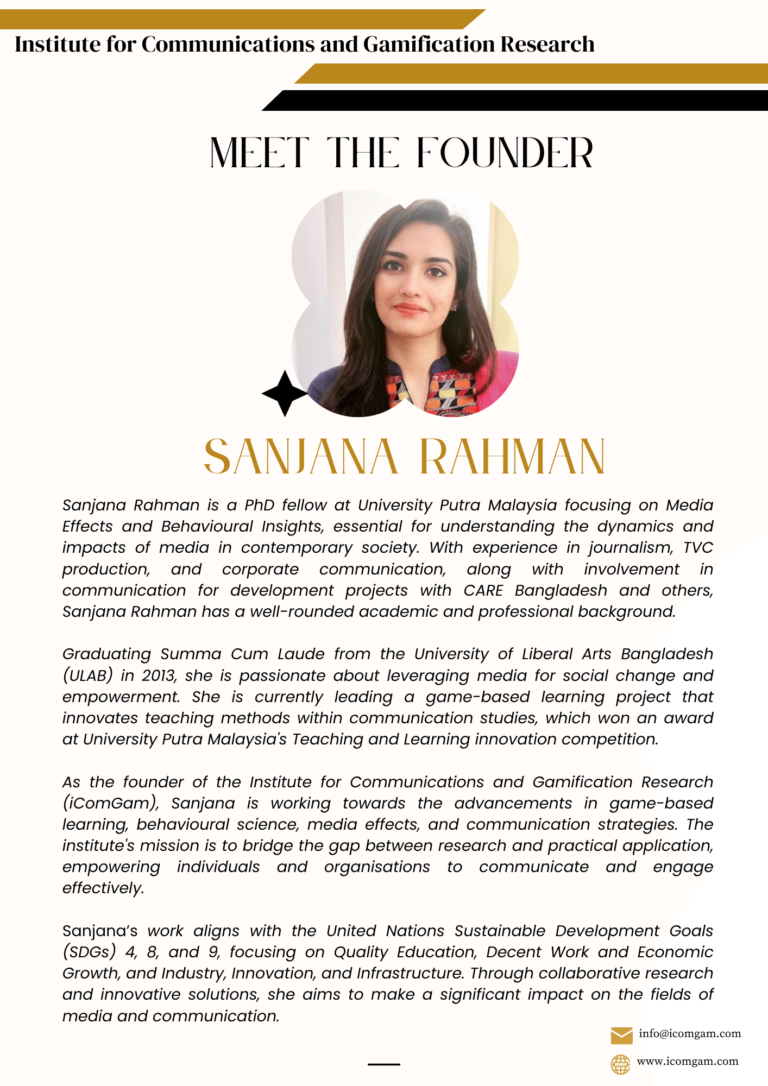
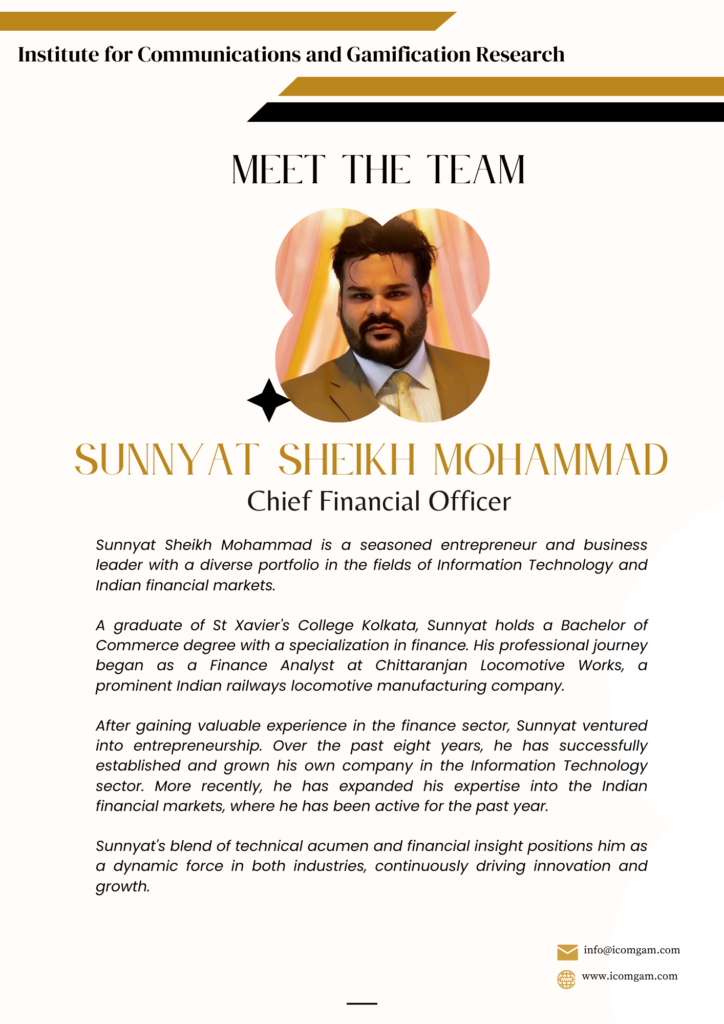
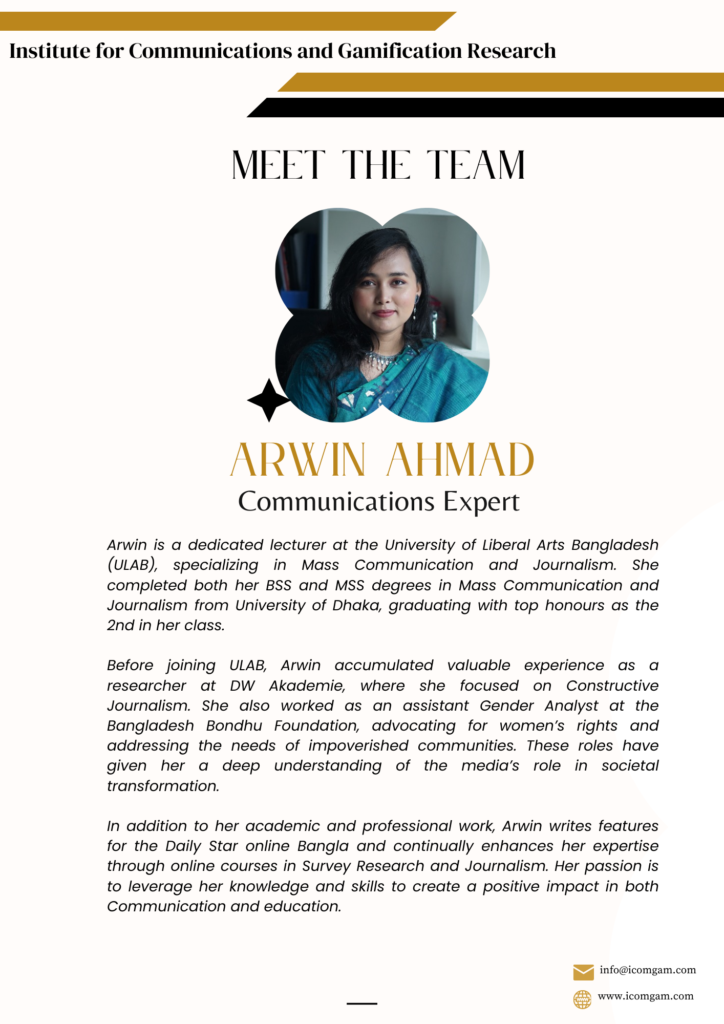

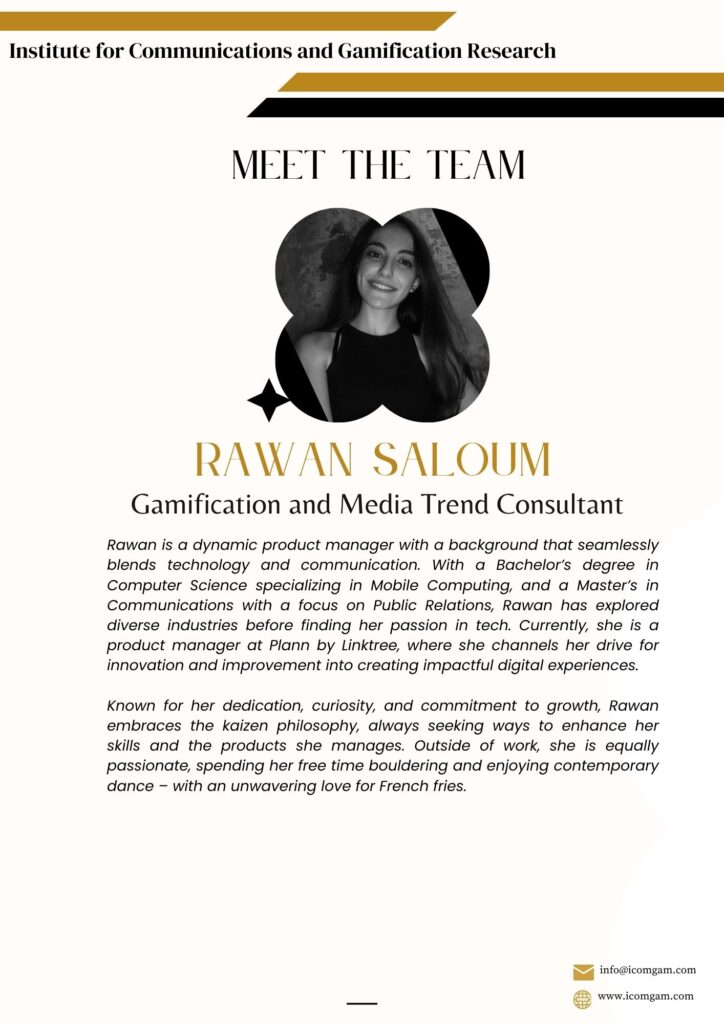
Board of Advisors
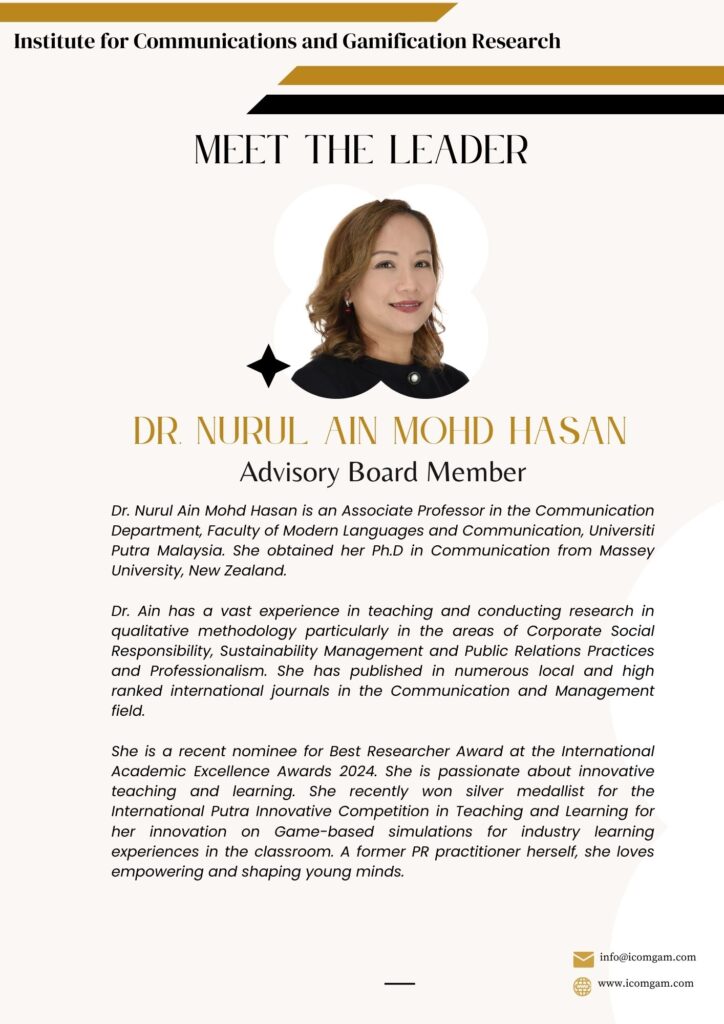
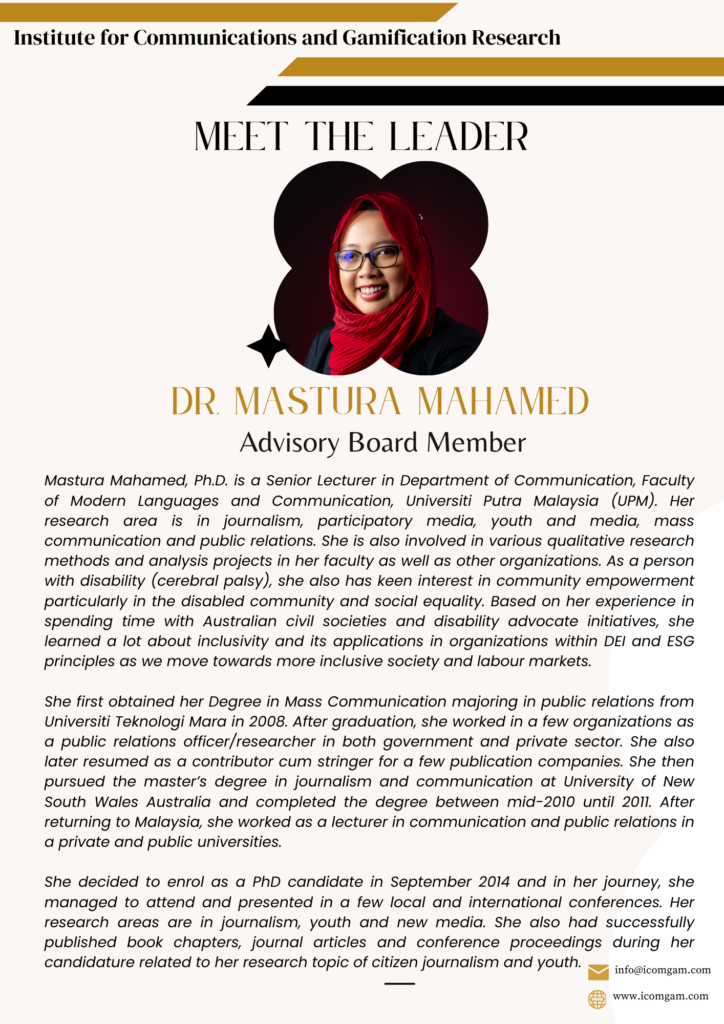
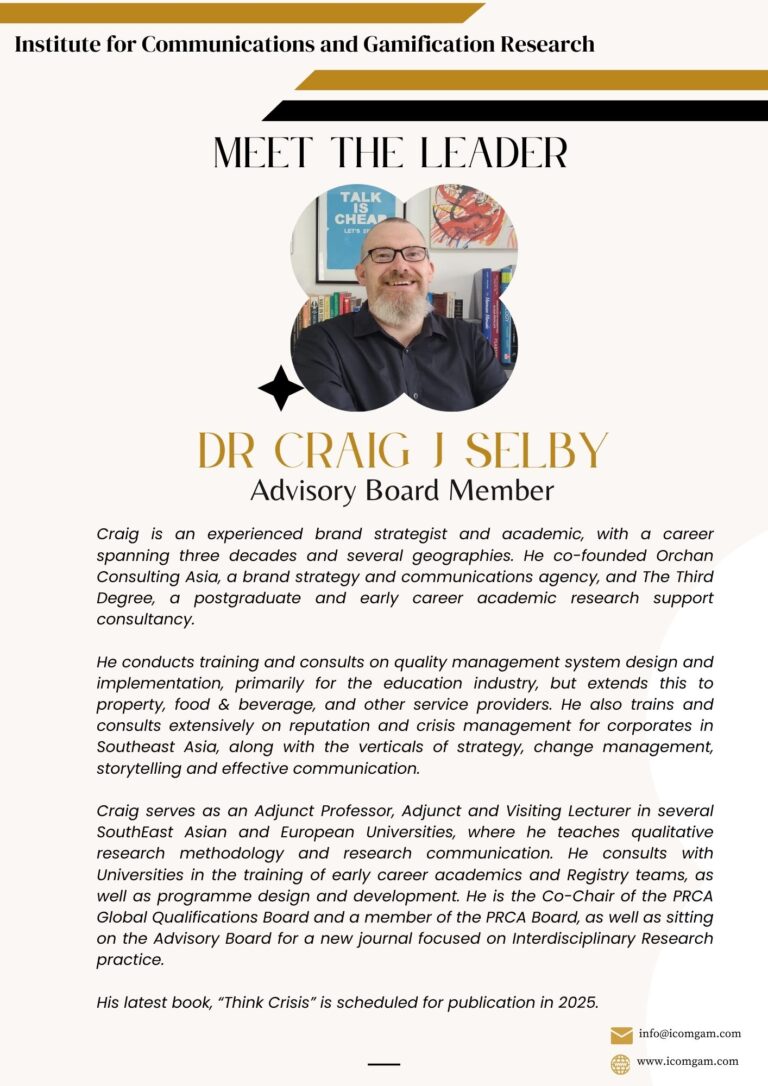
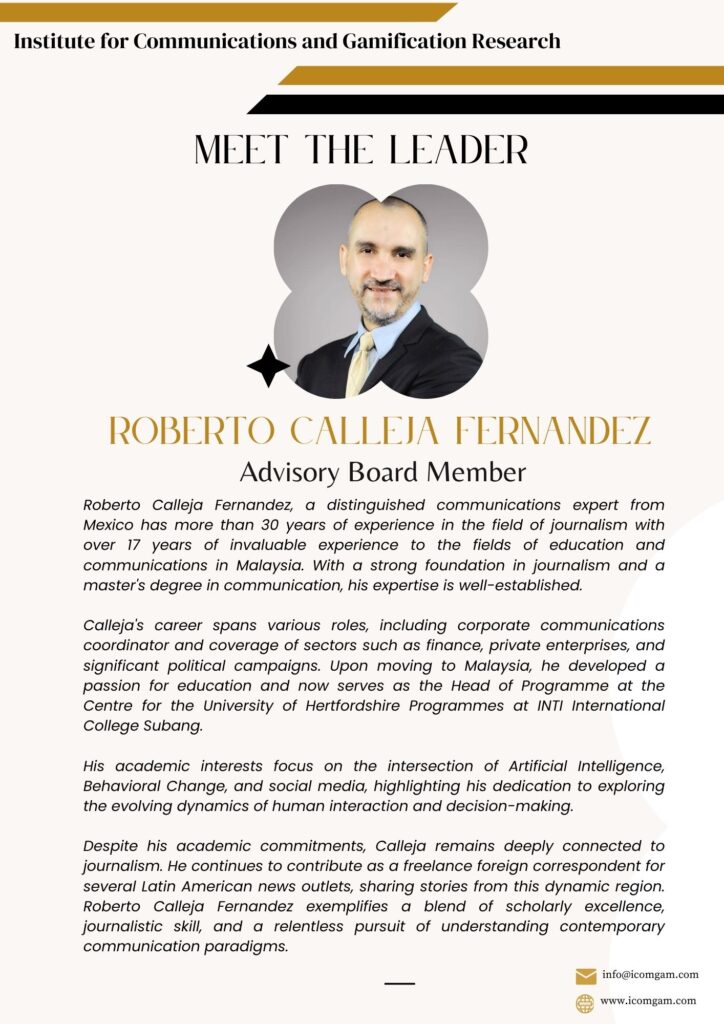
Join Us
Connect with us to stay updated on our latest research, events, and publications. Whether you are an academic, a business leader, or a creative professional, we invite you to join our community and collaborate with us in advancing the fields of communication and gamification.
![]()
Live Chat Support
Institute for Communications and Gamification Research (iComGam)
![]()
Email Support
info@icomgam.com
![]()